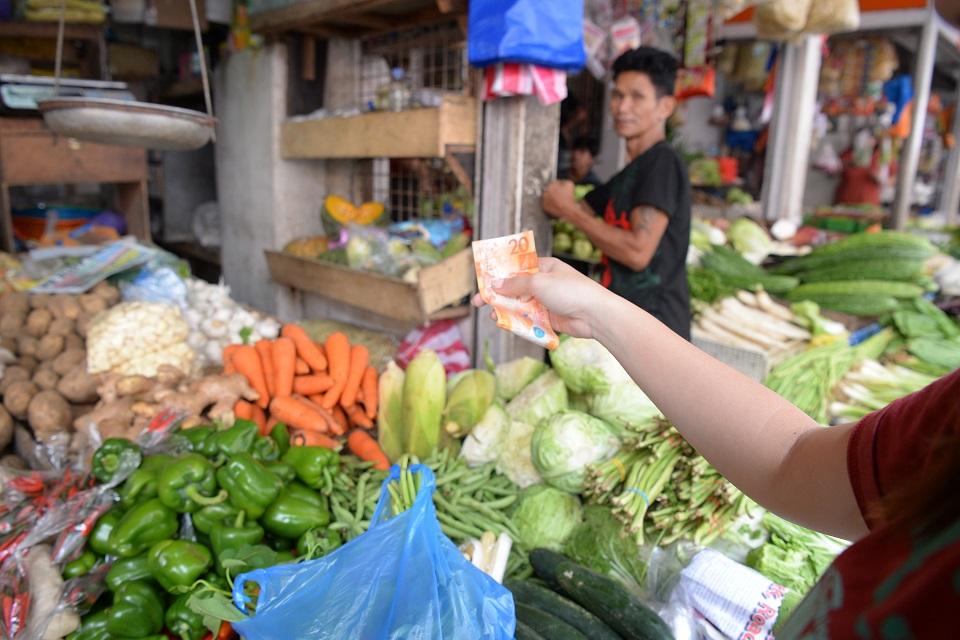Inflation rate accelerates to 3.7% in March

The Philippines' inflation rate accelerated further in March, marking its second straight month of acceleration amid faster increases in food and transportation costs, the Philippine Statistics Authority (PSA) reported on Friday.
At a press briefing, National Statistician and PSA chief Claire Dennis Mapa said inflation —which measures the rate of increase in the prices of goods and services—quickened to 3.7% in March 2024 from 3.4% in February 2024.
Last month's inflation rate, however, was slower than the 7.6% rate seen in March 2023.
This brought the year-to-date inflation print to stand at 3.3%, falling within the government’s ceiling of 2% to 4%.
It also fell within the BSP’s 3.4% to 4.2% forecast range for the period.
Uptrend
Mapa said the main factor that influenced the overall inflation uptrend in March was the heavily-weighted Food and Non-Alcoholic Beverages index, which saw an inflation rate of 5.6% from 4.6% in February.
The Food and Non-Alcoholic Beverages index contributed 76.4% to the overall inflation rate increase for the month.
Faster upticks in Transport index at 2.1% from 1.2% month-on-month, as well as Restaurants and Accommodation Services at 5.6% from 5.3% a month earlier, also contributed to March’s inflation uptrend.
Likewise, food inflation —which tracks price movements in a “basket” of foods commonly purchased by households— accelerated to 5.7% from 4.8% in February.
The main culprit was rice again, which saw an inflation rate of 24.4%, faster than 23.7% in February.
This was also the fastest inflation print for the grain staple in nearly 15 years, when it clocked in at 24.6% in February 2009.
Meat inflation also increased to 2% from 0.7% month-on-month.
Meanwhile, inflation rate felt by the bottom 30% income households in the country also rose to 4.6% from 4.2% in February, still due to faster increases in Food and Non-Alcoholic Beverages at 7.1% from 6.4% a month earlier.
Food inflation for the income class, likewise, quickened to 7.4% from 6.5%.
Dry season
National Economic and Development Authority (NEDA) Secretary Arsenio Balisacan said that the agency is "closely monitoring weather conditions and their effects on the supply of key commodities."
Balisacan said NEDA is keeping a close eye on whether this will result in sudden price increases.
"To ensure sufficient water supply and support our farmers during the dry season, the Department of Environment and Natural Resources has been tasked with monitoring water supply in the country. Simultaneously, the Department of Agriculture (DA) is proactively extending assistance to farmers adversely affected by the drought," he said.
The NEDA chief reaffirmed the government's commitment to secure the nation's food and energy supplies while proactively addressing potential price fluctuations.
As El Niño conditions persist and La Niña threatens the latter half of the year, the government is implementing strategic measures following a holistic approach to managing inflation, according to the country’s chief economist.
"While we continue to face multiple risks, such as potential adjustments in transportation fares, wages, and service utility fees, the Marcos Administration is committed to managing the country's inflation. This will be key to sustaining our growth momentum and providing a better life for our countrymen," Balisacan said.
House ways and means committee chairperson Joey Salceda said efforts to tame inflation should be focused on rice.
“Food inflation accounts for some 57% of the total inflation this March. Without the abnormal price of rice in the global market, inflation would have been closer to 3.1%, which is well within an acceptable range. The game plan must be focused on rice,” Salceda said.
“Because rice is the greatest driver of overall prices and rice requires the most irrigation of all major crops, the greatest upside risk to inflation moving forward is El Niño. In instances where it is available, we should be able to impound water. Farmers with on-farm reservoir systems tend to endure El Niño better, not to mention providing additional opportunities in fish production,” he added.
The Albay lawmaker said farmers with on-farm reservoir systems are also less reliant on large-scale irrigation projects, which, while optimal, tend to take years to complete.
“PAGASA’s forecasts indicate that this April, rainfall shouldn’t actually be catastrophically below normal. We will still see some rain, so we should impound that,” Salceda said.
“The worst droughts will be in May, with the hardest-hit regions being Central Luzon and Bicol. But models suggest that El Niño will taper off in June,” he added.
The Development Budget Coordination Committee retains its target range for the inflation rate at 2% to 4% for 2024 until 2028.
The DBCC expressed optimism that the monetary and non-monetary measures will rein in commodity prices and prevent future surges. —with Llanesca Panti/VAL/VBL, GMA Integrated News




